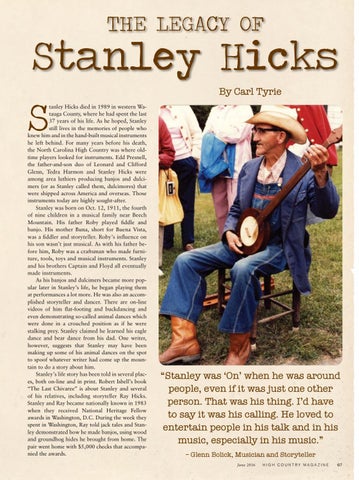The Legacy of
Stanley Hicks S By Carl Tyrie
tanley Hicks died in 1989 in western Watauga County, where he had spent the last 37 years of his life. As he hoped, Stanley still lives in the memories of people who knew him and in the hand-built musical instruments he left behind. For many years before his death, the North Carolina High Country was where oldtime players looked for instruments. Edd Presnell, the father-and-son duo of Leonard and Clifford Glenn, Tedra Harmon and Stanley Hicks were among area luthiers producing banjos and dulcimers (or as Stanley called them, dulcimores) that were shipped across America and overseas. Those instruments today are highly sought-after. Stanley was born on Oct. 12, 1911, the fourth of nine children in a musical family near Beech Mountain. His father Roby played fiddle and banjo. His mother Buna, short for Buena Vista, was a fiddler and storyteller. Roby’s influence on his son wasn’t just musical. As with his father before him, Roby was a craftsman who made furniture, tools, toys and musical instruments. Stanley and his brothers Captain and Floyd all eventually made instruments. As his banjos and dulcimers became more popular later in Stanley’s life, he began playing them at performances a lot more. He was also an accomplished storyteller and dancer. There are on-line videos of him flat-footing and buckdancing and even demonstrating so-called animal dances which were done in a crouched position as if he were stalking prey. Stanley claimed he learned his eagle dance and bear dance from his dad. One writer, however, suggests that Stanley may have been making up some of his animal dances on the spot to spoof whatever writer had come up the mountain to do a story about him. Stanley’s life story has been told in several places, both on-line and in print. Robert Isbell’s book “The Last Chivaree” is about Stanley and several of his relatives, including storyteller Ray Hicks. Stanley and Ray became nationally known in 1983 when they received National Heritage Fellow awards in Washington, D.C. During the week they spent in Washington, Ray told jack tales and Stanley demonstrated how he made banjos, using wood and groundhog hides he brought from home. The pair went home with $5,000 checks that accompanied the awards.
“Stanley was ‘On’ when he was around people, even if it was just one other person. That was his thing. I’d have to say it was his calling. He loved to entertain people in his talk and in his music, especially in his music.” – Glenn Bolick, Musician and Storyteller June 2016
High Country Magazine
67
